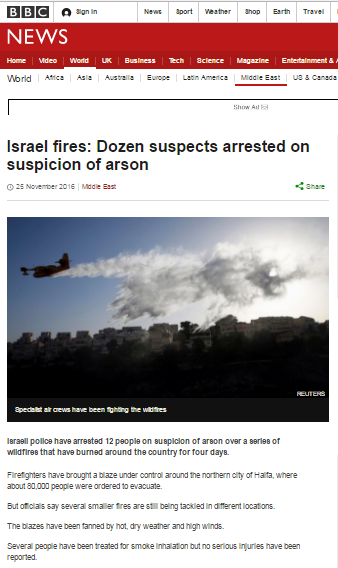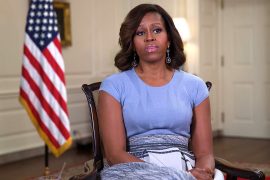On October 27th the BBC News website published two filmed reports (apparently also shown on BBC television programmes) concerning the upcoming election in the United States.
A video headlined “US election: How Israelis view the presidential contest” appeared on the website’s Middle East page as well as on its page titled ‘US Election 2016’ and its synopsis reads as follows:
“Israelis have been watching the US presidential election closely, with many focusing on how the candidates stand on bilateral relations, the stalled peace process with the Palestinians, and regional security issues.
The BBC asks Israelis how they would vote.”
The vast majority of Israelis are of course not entitled to vote in the US election and so that question actually has no practical relevance. Nevertheless (and despite the above claim that “the BBC asks Israelis”), in that video BBC audiences were presented with statistics credited to “The Peace Index”.
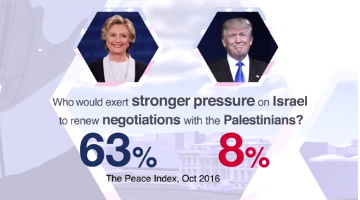
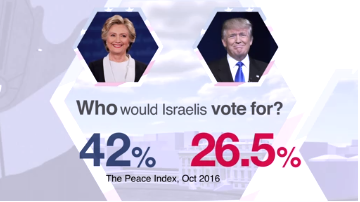
However, examination of the original data (see ‘Data File’) on ‘The Peace Index’ website shows that the BBC has misrepresented the information by claiming that those statistics relate to “Israeli” opinions when in fact they only represent the results obtained from Jewish Israelis who make up 74.8% of the country’s total population.
“At this time a clear majority (55%) of the Jewish public holds the opinion that Hillary Clinton will win the U.S. presidential elections, while only 25% believe that Donald Trump will be elected (note that the survey was conducted before the publication of the “hot-mic tape”). With a smaller but still considerable disparity, a majority of the public (42%) thinks that from Israel’s standpoint it is preferable for Clinton to be elected, while 26.5% see it as preferable for Trump to be elected. At the same time, an overwhelming majority (63% vs. 8%) assesses that if Clinton is elected she will exert heavier pressure on the Israeli government to renew the negotiations with the Palestinians. Among the Arab interviewees the picture is very similar: 57% anticipated that Clinton would be elected, 41% saw her as preferable from Israel’s standpoint, but only 30% thought she would exert stronger pressure on Israel regarding the conflict with the Palestinians. The highest rate (34%) of the Arab interviewees assessed that neither of the two candidates for the U.S. presidency will exert pressure on Israel to return to the negotiating table.”
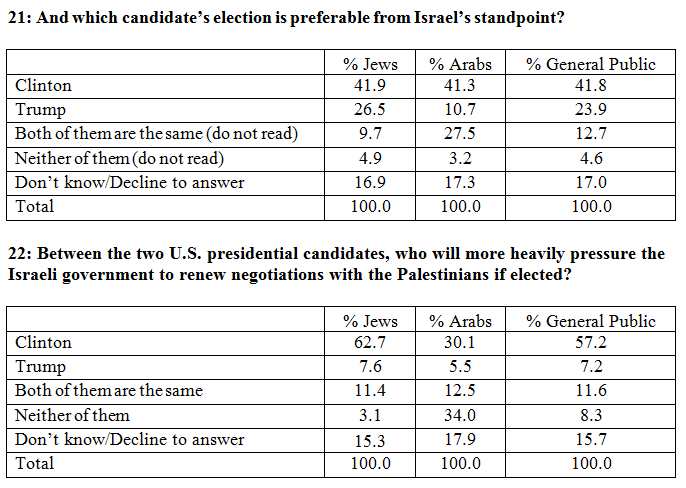
Another filmed report headlined “Who are Israeli-Americans supporting in the US election?” appeared very briefly on the BBC News website’s Middle East page as well as on the ‘US Election 2016’ page.
In the synopsis BBC audiences are told that:
“The US election campaign has been followed around the world.
Israel is perhaps one of the countries where the vote will be most closely watched.
In fact, it is being keenly fought there too, among the estimated 300,000 American citizens who have settled in Israel, America’s key ally in the region.
American-Israelis are thought to have traditionally favoured the Republican Party and Trump supporters have been particularly active on the ground hoping that absentees registered in some of the swing states could make a difference.
Thomas Fessy reports from Jerusalem.” [emphasis added]
In the report itself Thomas Fessy shows a debate between Republicans and Democrats in Jerusalem and tells viewers that:
“….both sides [are] courting up to two hundred thousand potential voters.” [emphasis added]
Viewers are not told where the numbers 300,000 and 200,000 come from but a report from the Times of Israel suggests that they are not based on official US figures.
“According to American officials, it is unclear exactly how many American citizens live in Israel, how many register to vote, and how many actually send in their ballots.
“We actually don’t track the number of American citizens in Israel. It is really impossible to know at any given time how many there are,” the US ambassador in Tel Aviv, Dan Shapiro, said Thursday.”
The same report informs us that:
“It is generally assumed, based on surveys and exit polls, that up to 80,000 US citizens living in Israel cast absentee ballots in 2012, which marked a drastic increase from 2008, when only 30,000 voted.”
And as for the number of dual American-Israeli citizens who have actually engaged in the process which would make them “potential voters” – opinions vary.
“In an interview Thursday with The Times of Israel, the co-chair of the Republicans’ Israel branch, Marc Zell, acknowledged that “nobody really knows” the exact numbers of Israelis registered to vote. But he insisted that, according to his assessment, the number must be somewhere between 100,00 and 120,000. […]
…US law requires Americans living abroad to request an absentee ballot before every single election. That means that even if 80,000 Israelis voted four years ago, it should not be taken for granted that they would automatically do so this year as well.
“Past numbers of overseas voters are not a valid indicator and should not be used for predictions about 2016,” said Eitan Charnoff, the national director of I Vote Israel, a nonprofit encouraging US expats to make use of their right to vote and helping them navigate the complicated registration process.
So far, Charnoff said Thursday in an interview, I Vote Israel has assisted only about 12,000 Americans in Israel who requested absentee ballots for the 2016 election. He noted, however, that “the final number is very likely to be higher than that, because many people are choosing to vote last minute who previously had not considered voting.” […]
Chaim Waxman, a former sociology professor at Rutgers University who now lives in Jerusalem, said he strongly doubts that 120,000 American-Israelis registered to vote in this election.
“I find it extremely difficult to believe it’s anywhere near that figure. I believe the numbers of voters from Israel will not be higher, possibly even lower than in the past,” he told The Times of Israel on Thursday.”
The BBC’s presentation of figures and statistics in these two reports obviously fails to meet editorial standards of accuracy.
Related Articles:
The BBC’s reporting of statistics and Gaza casualty ratios

